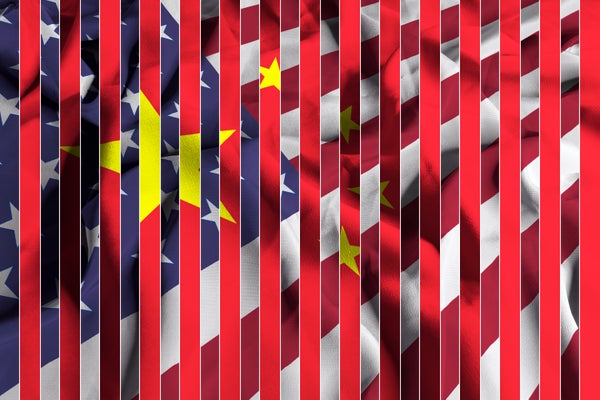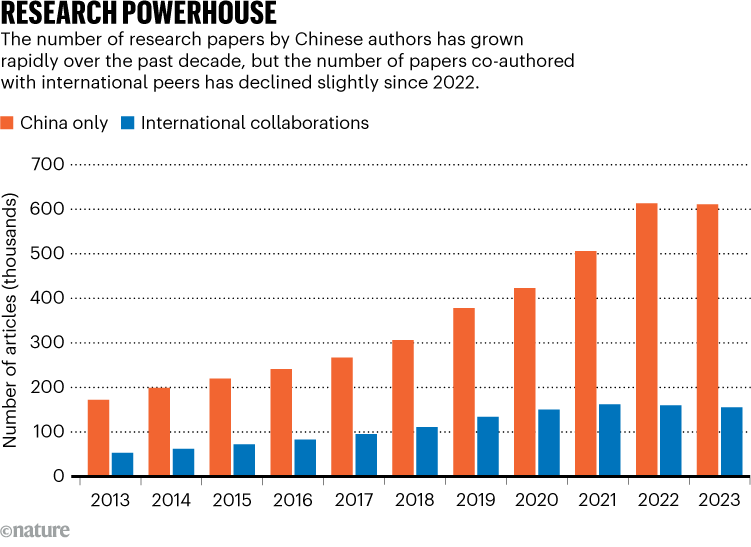China-US scientific collaboration declines, delaying key research
The United States and China are collaborating less on projects across scientific disciplines amid a culture of fear in both countries.

Manuel Augusto Moreno/Getty Images
The analysis found that since the pandemic, China’s scientific collaboration with other countries has declined due to a decline in cooperation with the United States.
Scientists have warned that political tensions between China and the United States, combined with the pandemic, are affecting research collaboration between the two countries, but evidence of this decline is taking time to accumulate in research databases.
The latest evidence comes from an analysis carried out by a Chinese team at Springer Nature.Nature(Springer Nature’s news team is editorially independent from the publisher, Springer Nature.) The authors used InCites, a tool owned by London-based publishing analytics company Clarivate, to analyze internationally co-authored papers published between 2013 and 2023. InCites draws on papers indexed in the scientific citation database Web of Science.
Support science journalism
If you enjoyed this article, please support our award-winning journalism. Subscribe. By purchasing a subscription, you help ensure a future of influential stories about the discoveries and ideas shaping the world today.
It found that 2022 saw the total number of papers co-authored by Chinese and international researchers decline for the first time since 2013 (see “Research Powerhouse”).

The proportion of research papers with Chinese and international co-authors has been declining for an even longer period: At its peak in 2018, 26.6% of Chinese papers in the InCites database (about 110,000) were co-authored with an international co-author. By 2023, the proportion of papers with international co-authors had fallen by 7.2%, even though the total number of Chinese papers had almost doubled over the same period to 759,000.
The decline in internationally co-authored papers is primarily due to China’s declining share of papers co-authored with US researchers, which fell by 6.4% between its peak in 2017 and 2023, the largest decline among the countries analyzed. The findings were presented at the Zhongguancun Forum in Beijing on April 25.
The decline in U.S.-China cooperation is consistent with the findings of an analysis conducted in 2022. NatureThe number of researchers affiliated with both the US and China in research papers published in Elsevier’s Scopus database fell by more than 20% between 2019 and 2021, according to the study.
The latest analysis shows that the share of papers from the U.S. and China has been gradually declining over the past six years, but the pandemic has exacerbated the downward trend, said Marina Zhang, an innovation researcher specializing in China at the University of Technology Sydney in Australia.
Political tensions
Zhang says ongoing geopolitical tensions between the US and China are also contributing to the decline in research numbers. “It’s especially worrying for researchers,” Zhang says. The controversial “China Initiative” launched by the US Department of Justice in 2018 to crack down on research and industrial espionage ended in 2022. The crackdown resulted in the arrest of several scientists for their ties to Chinese collaborators and research institutions, raising fears among researchers of Chinese descent. Since then, the US government has adopted various policies focused on strengthening research security. And in July 2023, the Chinese government enacted a revised counter-espionage law, broadening the definition of espionage.
Zhang said a crackdown on perceived foreign interference in both the United States and China has made researchers more cautious about collaborating. Restrictive policies and an atmosphere of fear could drive talent away from certain countries and fields, leading to “brain drain and loss of valuable human capital,” he said.
This “chilling effect” on U.S.-China cooperation is already hindering impactful research, says Tang Li, a researcher specializing in science and innovation policy at Fudan University in Shanghai, China. For example, a 2024 study looked at the impact of the National Institutes of Health’s foreign interference investigations on researchers and found that U.S. researchers with collaborators in China were less productive during this period than their colleagues with scientific partners in other countries.
Zhang said weakening cooperation between the United States and China could result in the two countries pursuing the same types of research separately, rather than working together to tackle global issues such as climate change, pandemics and food security.
Becoming introverted
A further concern, Zhang said, is that scientific research could become a more nationalistic endeavor as countries increasingly prioritize their domestic interests over international cooperation.
China’s cooperation with other countries has also gradually decreased since 2020, but not as significantly as its cooperation with the United States. Tang said the revival of U.S.-China cooperation is crucial because such scientific partnerships can help bridge the gap between the two countries. “Given the increasing number of global disasters and uncertainties, humanity cannot afford to waste time on nationalistic conflicts,” she said.
This article is reprinted with permission. First Edition July 19, 2024.

